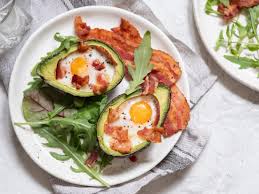Source: insider.com
The high-fat, low-carb keto diet has been around for 100 years as a therapeutic treatment for epileptic seizures, but it’s recently gained favor with celebrities and heath enthusiasts alike as a foolproof way to lose weight. The idea with keto is to shift the body into a state of fat-burning ketosis, by banishing nearly all carbs (no sweet apples or bread allowed), and fueling up on 70 to 80% fat every day.
It’s been tried by Hollywood stars including the Kardashians and Halle Berry, while Silicon Valley tech workers swear by its ability to lift their mental fog. Doctors are also starting to believe the plan holds promise for staving off diabetes. There’s even evidence to suggest that maybe it could one day help some drugs better combat cancer.
Health experts are still cautious about recommending the plan across the board, however, not only because it’s difficult to follow, but more importantly, because there isn’t much long-term data about what it may do to heart health after years or decades of use. Cardiologists and kidney doctors are already expressing serious concerns about what they’re seeing in practice when certain patients go high-fat.
Going low-carb can be bad for your heart
Cardiologist Elizabeth Klodas says not all of her patients have done well on the trendy plan.
“Stop. Stop!” she told Insider. “In my own practice, the people that have adopted it, their cholesterols can just go crazy.”
She’s not the only heart doctor to have pointed this out.
Cardiologist Ethan Weiss, who himself has become an ardent follower of a high-fat keto diet plan, says that while high cholesterol isn’t a common issue with keto, it can happen.
“I think the vast majority of people who go on this diet will have no trouble with their cholesterol,” Weiss told Business Insider last year. “But I’m not going to tell the people that do have trouble with their cholesterol that it’s not a problem.”
He sometimes suggests a high-fat keto plan to his patients working to manage diabetes, obesity, and other metabolic issues. But he’s cautious about how and when he prescribes it, recommending what he calls a “heart healthy” keto, with lots of fatty fish, olive oil, nuts, and avocado in the mix.
Klodas said those are all healthful additions to any diet that she would endorse to her patients, too.
“It’s not about high fat, low fat, it’s good fat, bad fat,” she said. “The oils in nuts and seeds, oils in fish, avocados, you don’t have to worry about those, those appear to be anti-inflammatory, they help cholesterol.”
But evidence suggests people tend to fuel up on bacon, cream, and coconut oil when going keto instead of favoring unsaturated, healthy fats.
Perhaps this is why studies show that people who follow low-carb diets tend to have a higher risk of death, and in particular, tend to die from coronary heart disease far more often than people who eat more carbohydrates. (Not everyone who goes low-carb will restrict their carb intake enough to enter fat-burning ketosis, however.)
Whether your diet is low-carb or high-carb, make sure you’re eating plenty of fruits, vegetables, and nuts
Klodas also doesn’t buy into the idea that going low-carb, while shunning the fruits, vegetables, beans, and grains that we know are linked to positive health outcomes, is a good idea.
“If you look at populations that eat a keto-type diet, the Inuit, for example, very few fruits and vegetables, right? Their average lifespan is 10 years shorter,” Klodas said. “None of these Blue Zones where people live long, well … none of them follow a keto diet.”
Klodas said the secret to better health lies in cooking more for yourself and incorporating more produce, like fruits, vegetables, and beans into what you eat. These can be high-carb, but also promote overall health.
Instead of overhauling people’s diets completely (often a failing strategy), Klodas has asked many of her patients to shift their eating routines through small, incremental changes. She started a line of packaged “Step One Foods” six years ago, which all include lots of fiber, alpha-linoleic acid, and plant sterols to help lower cholesterol.
The idea is that patients might make two simple “swaps” to their diet a day, switching out an afternoon candy bar or a breakfast pastry with something from her line like a serving of oatmeal or a smoothie.
At an American Heart Association scientific session in 2018, Klodas presented academic research conducted (in conjunction with the Mayo Clinic and University of Manitoba) on 54 patients, which suggested that her swaps really work. They helped people reduce their total cholesterol by about 5% in a monthlong trial, without any additional drugs.
She sees her program as one small way to start people down a path to choosing more healthful foods, lowering their overall cholesterol without the potential for some of the mind-altering side effects that statins can have.
“What I see are deficiencies of fiber, antioxidants, healthy fats,” she said. “That’s the thing that’s really missing in people’s lives.”
